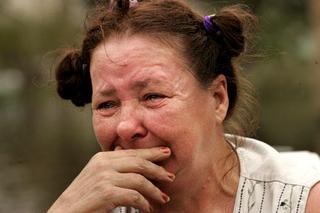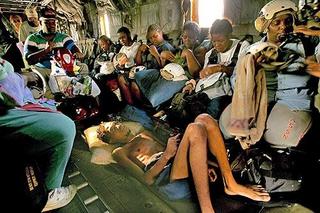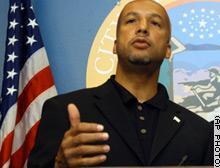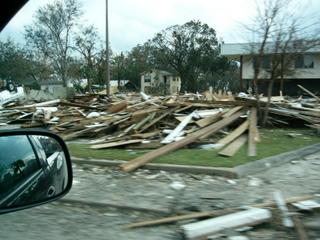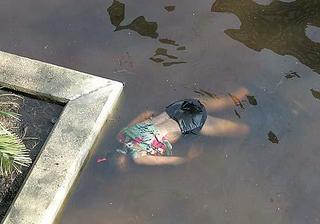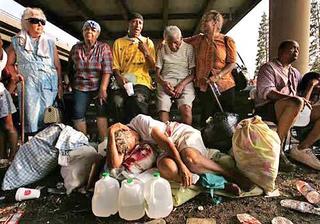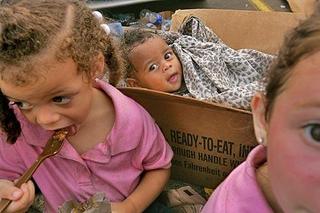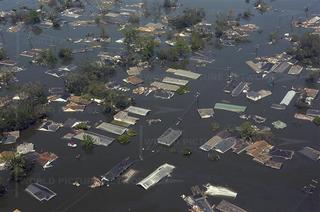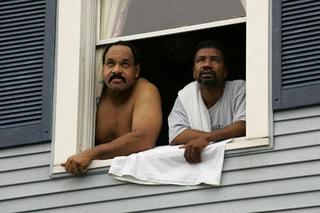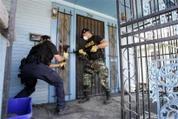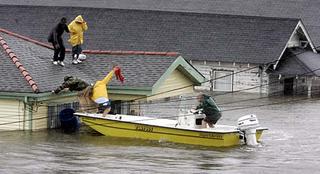Woman in Mason lied to get aid, police say
Professed victim of Katrina jailed on fraud charge

(Photo by Rod Sanford/State Journal file photo)
Published September 20, 2005
By Christine Rook
Lansing State Journal[ From the Lansing State Journal ]
Accused: Kim Horn, seen recently with her dog, told the State Journal for a Thursday story she returned to Mason after losing almost everything to Hurricane Katrina. Police say she lied.
MASON - Police on Monday led Kim Horn from the back door of her new home, her hands cuffed behind her back.
The woman who had told the Mason community she lost almost everything to Hurricane Katrina now stands accused of duping the very city where she grew up.
A police officer helped her into the back seat of a marked Ford Explorer.
She ignored a reporter's question, simply smiled at the officer and said in a quiet voice:
"You can close the door."
The door slammed shut, and the Explorer headed to Ingham County Jail, where Horn, 42, was arraigned and bond set at $25,000.
The charge: felony larceny under false pretenses, which carries a prison term of up to five years.
As difficult as it may be to accept, scams are often part of the aftermath of a major disaster. After the Sept. 11, 2001, terror attacks, there were numerous reports of people grabbing for handfuls of the free aid that came flowing in.
For example, this past year, a woman in Grand Rapids was sentenced to 10 months in jail for wrongly accepting more than $90,000 in aid meant for 9/11 victim families.
Whether Horn will be cleared of her charge remains to be seen. A pretrial hearing is set for Sept. 29.
Community gifts
Horn and her 6-year-old daughter Tessa hadn't even spent a week in the house that was partially a gift from the community.
The rent had been reduced to $500 per month, and the first month was free. It came almost fully furnished through donations: dishes, furniture, towels, linens, a washer and dryer. There was even a bicycle for Tessa, a DVD player and a television.
But on Thursday, after a profile about Horn appeared in the Lansing State Journal, accusations bubbled up that her story was a scam.
If it was a scam, then city officials and St. Vincent Catholic Charities had also been tricked.
Horn told people her new house in a place called Kenner outside New Orleans had been swept away by the storm and that the family's vehicle had been spotted two miles away. She, her husband, their two children and their dog had fled north just ahead of the devastation. Her husband and son remain in Louisiana, she has said. They could not be reached for comment.
Details of the story, however didn't add up for officials.
"When things started smelling some," city police Chief John Stressman said, "we decided to follow the odor."
Far from Katrina
Police say that although Horn did live in Louisiana, she didn't live even close to Kenner or any area touched by the hurricane-force winds.
When asked if she bought a house in Kenner, Mason Detective Lynne Mark said, "No."
Mark delivered the arrest warrant to Horn.
In fact, Mark said Horn didn't have any property there. She has a house in Leesville, police say, which is unmarred by the storm.
Horn, who had graduated from Mason High School and was considered one of the city's own, had already made friends with the neighbors on her street.
"I still feel for the woman," said Marie Wingo, who lives across the street and helped organize some of the donations for Horn.
So many people in Mason had come together to help Horn.
"My child gave her daughter a toy," Mayor Robin Naeyaert said.
As for Tessa, she appeared blissfully oblivious to Monday's proceedings. Detective Mark led the girl and her tiny dog out of the house early so she did not have to see police handcuff her mother.
"We're just getting out of eyeshot here," Mark said, leading the girl to the next lot. They were eventually released to the custody of a family member.
"I'm convinced 99 percent of the population are doing the right things for the right reasons," Mark said, affirming that the day's events hadn't shaken his faith in people. "There are true and honest victims out there who still need our support."
Kim Horn, charged with felony larceny under false pretenses, which carries a prison term of up to five years, faces a preliminary exam Sept. 29. She is in the Ingham County Jail on a $25,000 bond.
Contact Christine Rook at 377-1261 or clrook@lsj.com.

